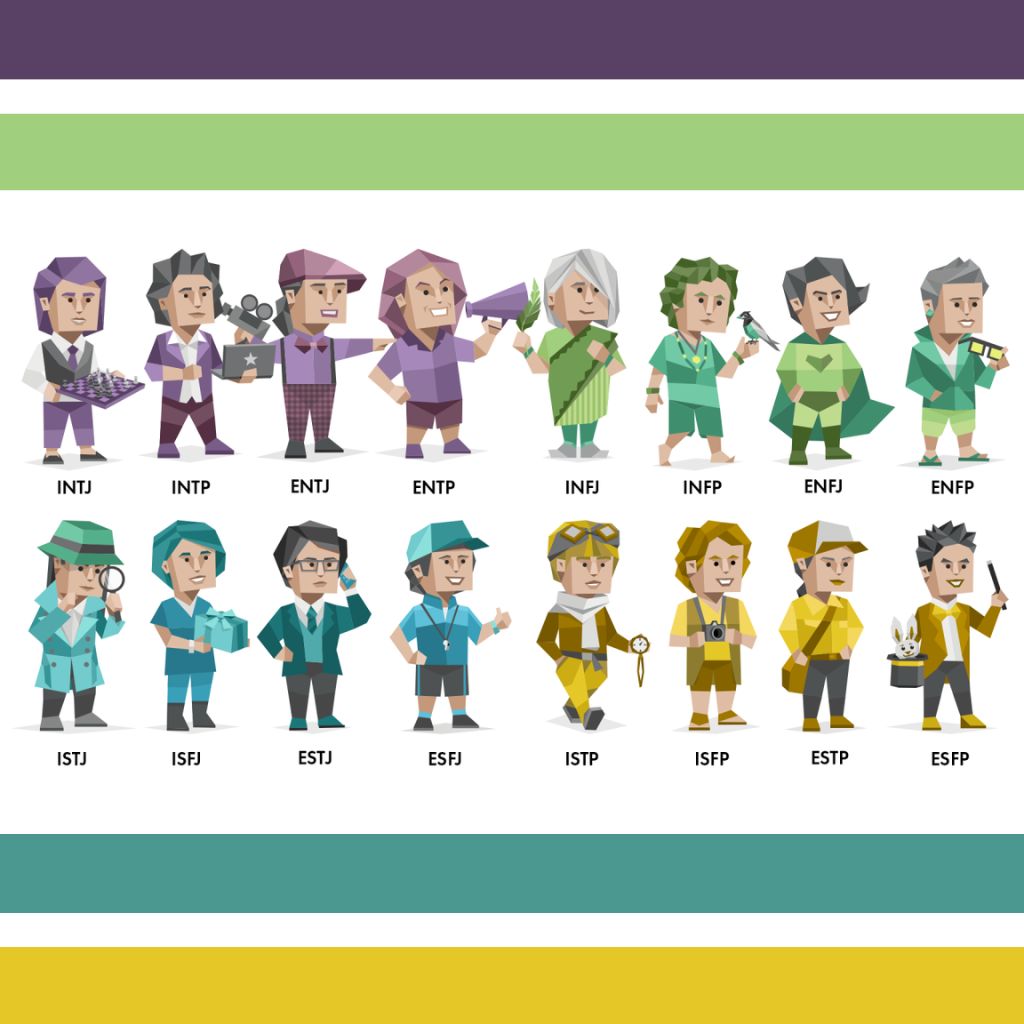✔Medically Reviewed by Saeideh Azizmohammadi, PhD, PsyD

Have you ever gotten into a debate with yourself in the shower, meticulously dissecting every word of a conversation you had hours ago?
It’s natural.
Everyone overthinks in some situations.
The problem arises when overthinking becomes a habitual pattern, leaving you feeling out of control.
In the midst of overthinking your overthinking, you might wonder if there’s a link between this and your personality type – and that’s why you’re reading this.
The Myers-Briggs Type Indicator (MBTI) offers a framework for understanding personality, and while not a diagnostic tool, it can help us better understand our behaviors.
Since overthinking is rooted in our thinking patterns and emotions, the MBTI might offer some clues about how our specific personality traits contribute to this thought spiral.
In this article, we’ll explore the connection between MBTI types and their tendency to overanalyze situations. We’ll delve into the cognitive functions of each type to see how they might contribute to the cycle of overthinking.
Before moving forward…
You should know that there are connections between MBTI preferences and mental health tendencies. But, they are just correlations, not guarantees, and other factors likely have a stronger influence.
The research on MBTI and mental health correlations, while interesting, doesn’t paint the whole picture. MBTI’s true strength lies in its potential to be a tool for self-awareness and personal growth. Not for diagnosing mental health conditions.
The 16 MBTI personality types
The Myers-Briggs Type Indicator (MBTI) classifies individuals into 16 distinct personality types, each of which is defined by a unique combination of four dichotomies:
- Extroversion (E) vs. Introversion (I): This dichotomy assesses how individuals derive their energy and where they focus their attention. Extroverts thrive in social settings, drawing energy from interactions with others, while introverts recharge through solitude and inner reflection.
- Sensing (S) vs. Intuition (N): Sensing types are pragmatic and grounded in the present, relying on their five senses to perceive the world. Intuitive types, on the other hand, are more abstract, relying on gut feelings and patterns to interpret reality.
- Thinking (T) vs. Feeling (F): This dichotomy gauges how individuals make decisions. Thinkers prioritize logic and objectivity, while feelers prioritize emotions, empathy, and personal values in their decision-making.
- Judging (J) vs. Perceiving (P): Judging types are structured and organized, preferring clear plans and closure, while perceiving types are adaptable and spontaneous, embracing flexibility and open-ended possibilities.

By combining these preferences, the MBTI system generates 16 personality types:
- Analysts (NT): INTJ, INTP, ENTJ, ENTP
- Diplomats (NF): INFJ, INFP, ENFJ, ENFP
- Sentinels (SJ): ISTJ, ISFJ, ESTJ, ESFJ
- Explorers (SP): ISTP, ISFP, ESTP, ESFP
Each type has its unique strengths, weaknesses, and tendencies regarding overthinking.
MBTI personality types and overthinking
Overthinking tendencies can be influenced by an individual’s dominant and auxiliary cognitive functions.
For instance, individuals with dominant Introverted Thinking (Ti, e.g., INTP or ISTP) may be more prone to overthinking due to their constant internal analysis and search for precision and accuracy in their thoughts.
Also, Intuitive (N) types, especially those with Introverted Intuition (Ni, e.g., INFJ or INTJ) as a dominant or auxiliary function, may be more susceptible to overthinking as they constantly seek hidden patterns and meanings in the world.
| Discover: OCD and MBTI – Is There a Connection?

Sensing types (e.g., ESTP or ISFP) with dominant Perceiving (P) functions may be prone to overthinking in situations where they feel the need to adapt quickly. They might second-guess their choices as new information arises.
We’ll explore each MBTI personality type tendency to overthink in the following:
1- Analysts (NT)
- INTJ and overthinking: The Mastermind – May overthink strategic decisions, constantly analyzing possibilities and outcomes, sometimes to the point of paralysis. May get stuck in “what-if” scenarios and struggle to make a final decision.
- INTP and overthinking: The Architect – May overthink complex concepts and theoretical problems, dissecting information endlessly and getting lost in mental rabbit holes. May ruminate on past mistakes or hypothetical situations.
- ENTJ and overthinking: The Commander – May overthink plans and goals, constantly striving for efficiency and optimization. May get fixated on controlling every aspect of a situation and overthink potential roadblocks.
- ENTP and overthinking: The Debater – May overthink arguments and conversations, playing devil’s advocate and dissecting every angle. May overanalyze social interactions and ruminate on past conversations, questioning their words and actions.
2- Diplomats (NF)
- INFJ and overthinking: The Advocate – May overthink the needs and feelings of others, constantly seeking meaning and connection. May get caught up in emotional loops, ruminating on past hurts or worrying about how their actions impact others.
- INFP and overthinking: The Mediator – May overthink creative ideas and possibilities, getting lost in daydreams and hypothetical scenarios. May struggle with self-doubt and overanalyze their artistic creations, questioning their worth.
- ENFJ and overthinking: The Protagonist – May overthink their role in the world and their impact on others. May get fixated on making a positive difference and overthink potential ways to contribute, leading to decision fatigue.
- ENFP and overthinking: The Campaigner – May overthink the possibilities and excitement of life, constantly chasing new experiences and ideas. May get overwhelmed by their options and overthink every decision, struggling to commit to a specific path.
3- Sentinels (SJ)
- ISTJ and overthinking: The Logistician – May overthink practical details and plans, ensuring everything is organized and well-structured. May get bogged down in minutiae and overthink potential errors or problems, leading to anxiety.
- ISFJ and overthinking: The Defender – May overthink the needs and expectations of others, constantly striving to be helpful and supportive. May get caught up in people-pleasing and overthink how their actions will be perceived, leading to self-sacrifice.
- ESTJ and overthinking: The Executive – May overthink deadlines and responsibilities, constantly pushing themselves and others to achieve goals. May get fixated on efficiency and control, overthinking every step of a process and struggling to delegate tasks.
- ESFJ and overthinking: The Consul – May overthink social harmony and group dynamics, constantly seeking to maintain order and avoid conflict. May get caught up in gossip or drama, overthinking conversations and relationships.
4- Explorers (SP)
- ISTP and overthinking: The Virtuoso – May overthink practical solutions and mechanical problems, constantly tinkering and experimenting. May get lost in troubleshooting details and overthink potential improvements, neglecting the bigger picture.
- ISFP and overthinking: The Artist – May overthink sensory experiences and aesthetic details, constantly seeking beauty and pleasure. May get caught up in self-expression and overthink their creative choices, struggling to finish projects.
- ESTP and overthinking: The Entertainer – May overthink the thrill of the moment and new experiences, constantly seeking excitement and stimulation. May get caught up in impulsive decisions and overthink the consequences later, leading to recklessness.
- ESFP and overthinking: The Performer – May overthink social interactions and entertainment possibilities, constantly seeking attention and enjoyment. May get caught up in the drama of life and overthink their public image, neglecting their responsibilities.
Does your personality type influence your susceptibility to depression?
Read the following article to find out:
Overthinking tendencies by MBTI type
| MBTI Type | Overthinking Focus | Example Overthinking Patterns |
| Analysts (NT) | – Strategic decisions – Complex concepts – Plans and goals – Arguments and conversations | INTJ: “What if I make the wrong decision and everything falls apart?” INTP: “Is this theory logically sound? What if there’s a flaw I haven’t considered?” ENTJ: “I need to have every detail of this plan perfect before I move forward.” ENTP: “Did I say the right thing? What if they think I’m stupid?” |
| Diplomats (NF) | – Needs and feelings of others – Creative ideas and possibilities – Role in the world and impact on others – Possibilities and excitement of life | INFJ: “Am I doing enough to help others? What if I’m letting them down?” INFP: “Is my art good enough? Will anyone appreciate it?” ENFJ: “What is my purpose in life? How can I make a difference?” ENFP: “There are so many options! How will I ever choose one?” |
| Sentinels (SJ) | – Practical details and plans – Needs and expectations of others – Deadlines and responsibilities – Social harmony and group dynamics | ISTJ: “Did I make a mistake? What if everything goes wrong?” ISFJ: “Am I being helpful enough? What if they’re upset with me?” ESTJ: “I need to get this done on time, no matter what. Everyone is counting on me.” ESFJ: “Is everyone getting along? What if there’s tension I’m not seeing?” |
| Explorers (SP) | – Practical solutions and mechanical problems – Sensory experiences and aesthetic details – Thrill of the moment and new experiences – Social interactions and entertainment possibilities | ISTP: “There must be a better way to do this. I need to find it.” ISFP: “Is this color right? Does it capture the feeling I want?” ESTP: “Let’s do something exciting! Who cares about the consequences?” ESFP: “Everyone’s having fun, right? I need to make sure the party keeps going!” |
| Uncover: Is There a Connection Between ADHD and MBTI Personality Type?
Which MBTI overthinks the most?

It’s important to be cautious when claiming any MBTI type is definitively “most prone” to overthinking. Overthinking is a complex issue influenced by various factors beyond personality type, and every individual can experience it differently.
However, some MBTI types may have inherent characteristics that make them more susceptible to certain overthinking patterns.
Here’s a look at some overthinking personality types (based on potential tendencies):
Highly introverted thinkers (INTJ, ISTJ)
- Overanalyzing: These types tend to overthink complex problems, strategies, and decisions, getting lost in mental rabbit holes and “what-if” scenarios. Their analytical nature can lead to rumination and difficulty making final decisions.
- Perfectionism: The desire for precision and control can manifest as overthinking details and rules, leading to anxiety and self-criticism.
Highly introverted feelers (INFJ, INFP)
- Emotional Sensitivity: These types are deeply affected by others’ emotions and can overthink social interactions, relationships, and potential consequences of their actions. They may ruminate on past hurts or worry excessively about others’ opinions.
- Idealism: INFJs and INFPs tend to hold idealistic views about the world and themselves, which can lead to overthinking possibilities, disappointments, and self-doubt.
Highly extroverted perceivers (ENFP, ENTP)
- Scattered Focus: These types thrive on excitement and new experiences, which can lead to overthinking endless possibilities and struggling to prioritize or follow through on plans. They may jump from one idea to another without finishing anything.
- Fear of Missing Out (FOMO): The desire to experience everything can lead to overthinking social commitments and constantly feeling like they’re missing out on something better.
It’s important to remember:
- Individuals within each type can vary greatly in their experience with overthinking.
- Other factors like stress, mental health, and life experiences can also influence overthinking patterns.
- Focusing on specific overthinking styles within each type can be more helpful than labeling one type as “most prone.”
Do you know which Myers-Briggs personality types are prone to addiction?
Read to gain insights:
MBTI Addiction | Who is Most at Risk?
MBTI types less prone to overthinking
While certain MBTI personality types, “may” be more prone to overthinking, others may tend to be more grounded and less prone to this cognitive pattern.
Two categories of types that typically exhibit lower overthinking tendencies include:
- Dominant Extraverted Sensing (Se): MBTI types with dominant Extraverted Sensing (Se) are known for their presence in the moment, strong focus on sensory experiences, and a practical approach to life. These qualities make them less likely to get caught up in excessive rumination and overthinking. Examples of Se-dominant types include ESTP and ESFP.
- Auxiliary Extraverted Feeling (Fe): MBTI types with auxiliary Extraverted Feeling (Fe) tend to prioritize harmonious social interactions and the emotions of others over overanalyzing personal thoughts and feelings. Their outward focus on the emotional atmosphere often leads to less overthinking about their inner world. Examples of Fe-auxiliary types include ENFJ and ESFJ.
| Suggestion: MBTI and Stress – Unlocking MBTI Stress Patterns
Managing overthinking

Overthinking, that mental merry-go-round of endless loops and what-ifs, can impact anyone, regardless of personality type. But understanding your MBTI preferences can offer valuable clues for tackling your specific overthinking tendencies.
Here are some tips tailor-made for each type:
For Analysts (NT):
- Tame the “what-if” beast: Set time limits for brainstorming and decision-making. Implement a “done is better than perfect” mindset to avoid analysis paralysis.
- Challenge your inner critic: Practice reframing negative thoughts with logic and evidence. Celebrate small wins and acknowledge your own accomplishments.
- Embrace the messy middle: Accept that uncertainty is part of life and allow yourself to be comfortable with not having all the answers.
| Read more: MBTI and Anxiety
For Diplomats (NF):
- Practice mindfulness: Ground yourself in the present moment through meditation or mindful activities. Identify and reframe emotional triggers to prevent rumination.
- Prioritize self-care: Nurture your emotional well-being through activities you enjoy. Express yourself creatively to release pent-up feelings.
- Set healthy boundaries: Don’t overextend yourself trying to please everyone. Learn to say “no” and prioritize your own needs and emotional space.
For Sentinels (SJ):
- Seek new perspectives: Step outside your comfort zone and listen to different viewpoints. Challenge your assumptions and be open to alternative solutions.
- Embrace flexibility: Accept that plans can change and unforeseen circumstances arise. Develop a contingency plan for potential scenarios without getting caught in “what-if” spirals.
- Focus on the present: Instead of dwelling on past mistakes or worrying about the future, channel your energy into completing tasks and enjoying the present moment.
| Read about: Which MBTI Procrastinates the Most?
For Explorers (SP):
- Channel your energy: Find healthy outlets for your impulsive tendencies through physical activities, creative pursuits, or adventurous hobbies.
- Prioritize structure: Create a loose framework for your day to avoid feeling overwhelmed by endless possibilities. Set small, achievable goals to maintain focus and momentum.
- Practice mindfulness: Develop self-awareness of your triggers and impulsive urges. Take a pause before reacting to avoid making hasty decisions you might regret later.
Bonus tip:
Combine these tips with effective mental health practices like regular exercise, healthy sleep habits, and seeking professional help if needed.
HealWiser’s last piece of advice…
Self-awareness is a critical tool for managing overthinking tendencies, especially when considering your MBTI personality type and overthinking. By acknowledging your thought patterns and accepting them as a part of your personality, you can start to take control and employ effective coping strategies.
Remember that while MBTI provides valuable insights, each person is unique, and no type can fully define you.
Sharing your experience can provide valuable insights and emotional support. So…
…share your story with HealWiser and others in the comments section below this post.






